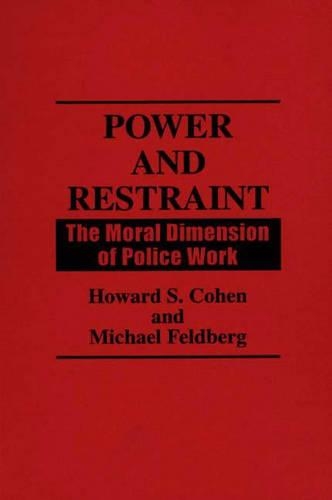
Power and Restraint: The Moral Dimension of Police Work
(Paperback)
Available Formats
Publishing Details
Power and Restraint: The Moral Dimension of Police Work
By (Author) Howard S. Cohen
By (author) Michael Feldberg
Bloomsbury Publishing PLC
Praeger Publishers Inc
30th June 1991
United States
Classifications
Tertiary Education
Non Fiction
174.93632
Physical Properties
Paperback
186
Description
In accepting the authority to govern, what responsibilities do the police incur "Power and Restraint" attempts to answer this question by using a moral perspective grounded in the social contract, and by defining an ethical basis for police work. Howard S. Cohen and Michael Feldberg posit five standards by which to measure responsible police behaviour; fair access, public trust, safety and security, teamwork, and objectivity. To test their proposals, Cohen and Feldberg apply these standards to several familiar yet challenging cases that are encountered in municipal patrol work in the United States, illustrating how police officers can develop appropriate moral responses to complex and difficult circumstances. These developed standards of ethical behaviour can be used as a basis for the rehearsal of decision-making and action in police training as well as for the judicious evaluation of police behaviour after the fact. The authors developed their theories over a ten-year period by spending hundreds of hours in seminars on police ethics with officers and trainers from across the country, discussing specific cases and examples of moral issues that were most troubling to the officers themselves. Their book should be valuable to instructors in university-level criminal justice courses that deal with ethics or the police. It could also be used in courses in applied ethics in philosophy and will be an important resource for police academy trainers for both in-service and recruit training.
Reviews
Power and Restraint is designed to provide police officers and police trainers with the resources needed to develop and implement effective ethics training. The first three chapters present a model for police ethics based on John Locke's Second Treatise of Civil Government. Each of the following four chapters focuses on a dilemma that might be faced by police officers, and is accompanied by discussion of the possible alternate responses to the dilemma. This is a unique text, as available information in the area of police ethics is limited. The authors, recognized experts in the field of police ethics, have been developing training materials for more than 12 years. The book is clearly written, well reasoned, and is adequately referenced and indexed. Recommended for libraries serving law enforcement training programs or academic programs in criminal justice.-Choice
"Power and Restraint is designed to provide police officers and police trainers with the resources needed to develop and implement effective ethics training. The first three chapters present a model for police ethics based on John Locke's Second Treatise of Civil Government. Each of the following four chapters focuses on a dilemma that might be faced by police officers, and is accompanied by discussion of the possible alternate responses to the dilemma. This is a unique text, as available information in the area of police ethics is limited. The authors, recognized experts in the field of police ethics, have been developing training materials for more than 12 years. The book is clearly written, well reasoned, and is adequately referenced and indexed. Recommended for libraries serving law enforcement training programs or academic programs in criminal justice."-Choice
Author Bio
HOWARD S. COHEN is Associate Provost and Professor of Philosophy at the University of Massachusetts--Boston. He developed a seminar in ethics for police trainers and curriculum developers at the Boston University Law Enforcement Trainers Institute and has published widely on issues relating to philosophy and criminal justice since 1973. His previous book, Equal Rights for Children, was published in 1980. MICHAEL FELDBERG is President of The Boston-Fenway Program, Inc., a community service organization specializing in public and community safety issues. He is the former director of the Criminal Justice Program at Metropolitan College, Boston University, where he currently holds the rank of Adjunct Professor of Urban Affairs and Criminal Justice. His previous books include The Philadelphia Riots of 1844: A Study of Ethnic Conflict (Greenwood Press, 1975), Moral Issues in Police Work (edited with Frederick Elliston), and Ethics for Professional Police (with Howard Cohen).
